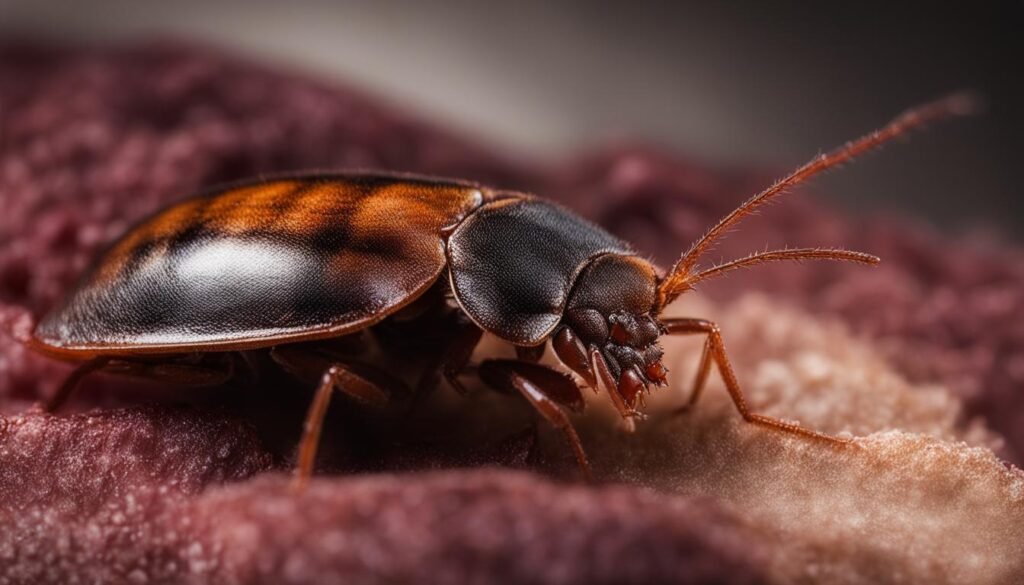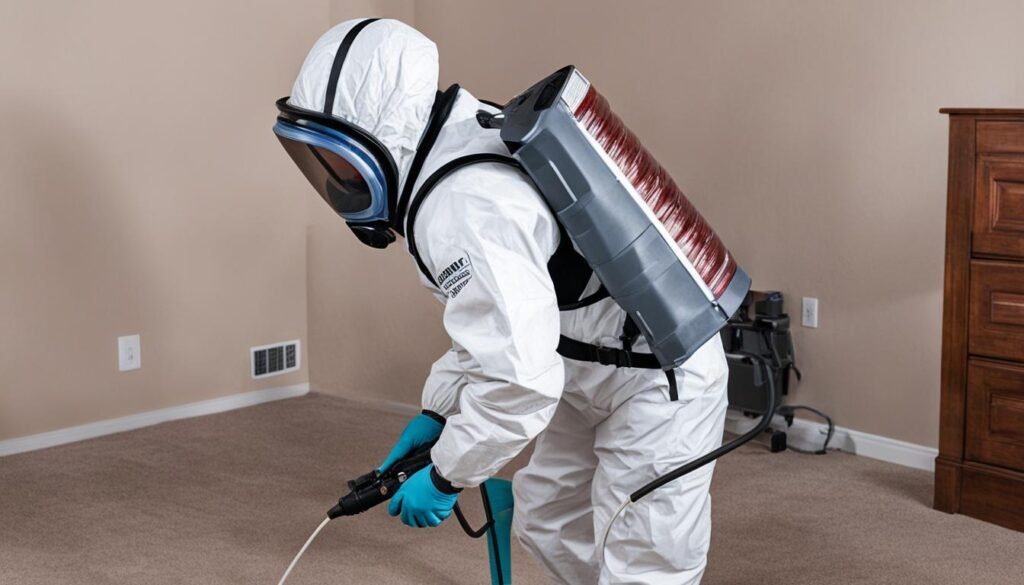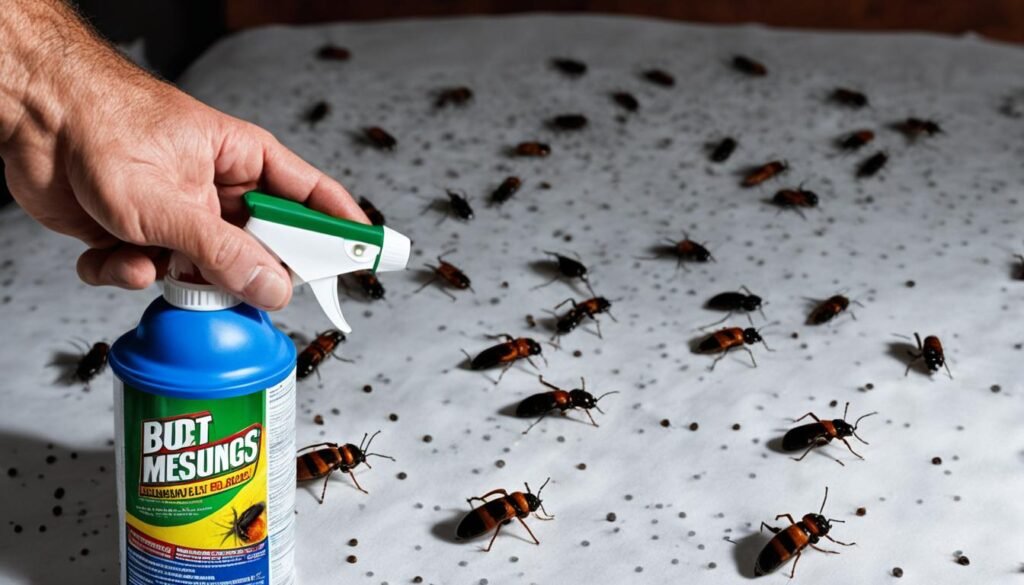Can Bed Bugs Survive Extermination?
Table of Contents:
Bed bugs are resilient pests that can be difficult to eradicate. Despite various extermination methods, bed bugs have developed resistance to many chemical treatments over the years, making them harder to eliminate. However, there are effective treatments available that can significantly reduce and control bed bug infestations. In this article, we will explore different extermination methods and their effectiveness in getting rid of bed bugs.
Can Bed Bugs Survive Extermination? Key Takeaways:
- Bed bugs are resilient pests that have developed resistance to many chemical treatments, making eradication challenging.
- Effective treatments are available that can significantly reduce and control bed bug infestations.
- Extermination methods like heat treatment have proven to be highly effective against bed bugs.
- Choosing a professional exterminator with expertise in bed bug control is important for successful elimination.
- DIY treatments can be attempted for less severe infestations, but professional assistance is recommended for optimal results.

Three Ways to Get Rid of Bed Bugs
When it comes to bed bug extermination methods, there are three main options that professional exterminators use to remove these stubborn pests: chemical treatment, cold treatment, and heat treatment. Each method has its advantages and limitations, so it’s important to understand them before deciding on the best approach for your situation.
Chemical Treatment
One of the most common bed bug treatment options is chemical treatment, which involves the use of insecticides to kill bed bugs at all stages of their life cycle. Chemical treatments can be effective in eliminating bed bugs, but it’s important to note that bed bugs have developed resistance to many chemicals over time. This means that certain insecticides may be less effective than others, reducing the overall success rate of chemical treatment.
Cold Treatment
Cold treatment, also known as cryogenic freezing or carbon dioxide treatment, uses frozen carbon dioxide to kill bed bugs. The freezing temperatures effectively freeze and kill bed bugs, including their eggs. However, cold treatment is not as effective against highly resistant bed bugs, as they have adapted to survive in extreme conditions. As a result, this method may not provide complete extermination in cases of severe infestations or when dealing with resistant bed bug populations.
Heat Treatment
Heat treatment has proven to be one of the most effective methods for bed bug extermination. This method involves raising the temperature in the infested area above 130 degrees Fahrenheit, which kills bed bugs and their eggs. Heat treatment is highly effective because it targets all stages of the bed bug life cycle, including hard-to-reach areas where bed bugs may hide. It is also less likely to leave behind chemical residues compared to chemical treatments. However, professionals should conduct heat treatment to ensure safety and proper execution.
Overall, bed bug extermination methods vary in their effectiveness. While chemical treatments and cold treatments may have limitations, heat treatment has shown to be one of the most reliable options for eliminating bed bugs. It’s important to consult with a professional exterminator who can assess your situation and recommend the most suitable treatment method based on the severity of the infestation, level of resistance, and other factors.
How to Choose a Good Exterminator
When it comes to professional bed bug extermination, selecting the right exterminator is crucial for effective and long-lasting results. To ensure you are hiring a reputable professional who can deliver the best outcomes, here are some key considerations:
1. Expertise in Bed Bug Control
Look for an exterminator with specific expertise in bed bug control. These pests have unique biology and behavior, and a knowledgeable exterminator will understand their patterns and vulnerabilities. Their expertise will aid in implementing targeted strategies to eliminate bed bugs effectively.
2. Integrated Pest Management (IPM) Strategies
An excellent exterminator will employ Integrated Pest Management (IPM) strategies. IPM involves a comprehensive approach that combines various treatment methods to tackle bed bugs from different angles. This includes a combination of chemical treatments, heat treatments, and non-chemical approaches for maximum effectiveness.
Tip: Avoid misconceptions that a good exterminator relies solely on chemicals or uses a single method for eradication. A holistic IPM approach is key to professional bed bug extermination.
3. Total Pest Control Strategy
A reputable exterminator should provide not only treatment but also preventative measures to ensure long-term success. They should assess your surroundings, identify potential entry points, and offer guidance on avoiding future infestations. This comprehensive strategy will give you peace of mind and help maintain a bed bug-free environment.
By carefully selecting a professional with expertise, incorporating IPM strategies, and ensuring a comprehensive approach, you can trust in their ability to achieve professional bed bug extermination.

| Advantages of Professional Extermination | Advantages of DIY Extermination |
|---|---|
| 1. Extensive knowledge and experience in bed bug control | 1. Cost-effective option |
| 2. Integrated Pest Management strategies for comprehensive control | 2. Immediate action without waiting for an appointment |
| 3. Access to specialized equipment and treatments | 3. Flexibility to address small-scale infestations |
| 4. Preventative measures to avoid future infestations | 4. Personal satisfaction in handling the problem |
How to Get Rid of Bed Bugs at Home
If you want to attempt DIY bed bug treatment at home, there are some steps you can take to exterminate bed bugs. Start by thoroughly inspecting your home for bed bug-infested areas and identifying signs of their presence. Spot treat affected areas with various methods to effectively eliminate these pests.
1. Vacuum: Vacuum all areas where you suspect bed bugs might be hiding, including mattresses, carpets, furniture, and baseboards. Be sure to dispose of the vacuum bag or empty the canister immediately to prevent bed bugs from escaping.
2. Launder-infested items: Wash bedding, curtains, clothes, and any other fabric items in hot water (at least 120°F). Dry them on high heat to kill any remaining bed bugs or eggs.
3. Seal cracks and crevices: Use caulk or sealant to fill in any cracks, crevices, or gaps in walls, furniture, and flooring. This will help prevent bed bugs from hiding and laying eggs in these areas.
4. Use non-chemical treatments: Consider using heat or pesticide sprays specifically designed for bed bug control. Heat treatments involve using devices or machines that generate high temperatures to kill bed bugs and their eggs. Pesticide sprays should be used cautiously and according to the product instructions.
Remember, DIY bed bug treatment may be effective for small infestations or as a temporary solution. However, for severe infestations or to ensure complete eradication, professional assistance is recommended.
Atlanta Bed Bug Infestation Statistics
| Year | Number of Reported Infestations |
|---|---|
| 2016 | 1,234 |
| 2017 | 1,543 |
| 2018 | 1,876 |
| 2019 | 2,310 |
| 2020 | 2,789 |
Although DIY methods can help control bed bugs, it’s important to monitor the situation and take preventive measures to avoid future infestations. Regularly inspect your home, encase mattresses and box springs with bed bug-proof covers, and minimize clutter to reduce hiding places for these pests.
Remember, eradication can be a challenging process, so seeking professional assistance from reputable exterminators is highly recommended for optimal results. They have the knowledge, experience, and advanced treatment methods to effectively exterminate bed bugs and prevent them from returning.

When it comes to bed bug extermination, it’s best to be proactive, thorough, and persistent. By following these steps and seeking professional help if needed, you can successfully eliminate bed bugs from your home and enjoy a peaceful night’s sleep once again.
Conclusion
So when you’re asking yourself, “Can Bed Bugs Survive Extermination?”, consider the following.
Ensuring effective bed bug extermination is crucial to eliminate these resilient pests from your home. While chemical treatments may have limited effectiveness due to bed bug resistance, cold treatments also have limitations in killing highly resistant bed bugs. However, heat treatment has proven to be the most effective method for exterminating bed bugs.
Heat treatment involves raising the temperature in the infested area above 130 degrees Fahrenheit, which effectively kills bed bugs and their eggs. This method is often used in combination with other strategies for comprehensive control. To achieve optimal results, it is important to choose a reputable exterminator who specializes in bed bug control, such as Atlanta Pest Control.
Professional assistance is recommended, especially for severe infestations, to ensure thorough extermination and prevent the reinfestation of bed bugs. It’s also essential to follow up with monitoring and preventive measures to maintain a bed bug-free environment in your home. By employing the right bed bug treatment options, such as heat treatment, and taking proactive measures, you can effectively eliminate bed bugs and achieve long-lasting relief from infestations.